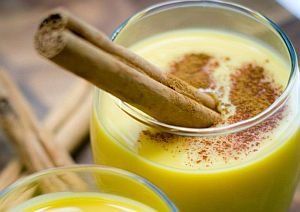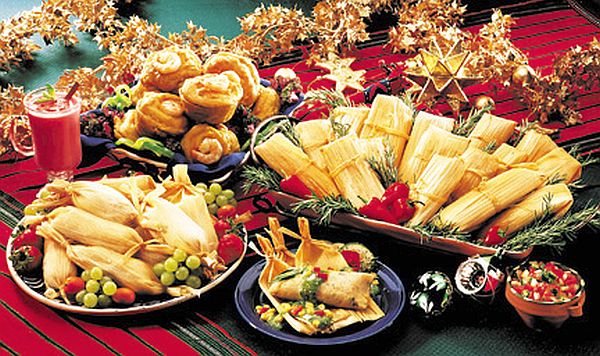Puerto Vallarta, Mexico - Christmas is a time to get together with family and friends to celebrate, but in Mexico, the holiday season is really all about eating. Any self-respecting Mexican Christmas celebration will include more food and drinks than you know what to do with - along with an almost uncomfortable feeling of fullness that last at least a week!
Many of the dishes enjoyed on Christmas and New Years have been prepared for hundreds of years and have a strong cultural meaning for Mexican people. For those who are unfamiliar with traditional Mexican holiday dishes, here is a little bit about each food's history and significance in Mexican culture.
Tamales
 |
Pozole
Pozole is a very labor intensive, hearty Mexican stew that takes almost an entire day to cook, however trust us when we say the flavor is worth the time. According to Aztec history, on special occasions after a ritual sacrifice, the bodies which had been sacrificed were cooked with maize and used as the meat in pozole. While todays pozole definitely does not contain human flesh, the ancient Aztec traditions of preparation are still used today. Pozole can either have a white, green or red broth with different spices giving it its unique flavor and color. The stew is also traditionally made with pieces of tender pork and hominy and can be topped with chopped cabbage, radishes, lime or cilantro depending on personal preference. Pozole is also a great cure for those killer New Year's Eve hangovers.
Chile en Nogada
 |
Rosca de Reyes - "Three Kings Bread"
Made for Las Posadas in late December or Dνa de los Santos Reyes on January 6th, this sweet holiday bread is shaped like a wreath and decorated with candied figs, lemon, cherries, and mango. A little baby Jesus doll is baked into the bread and whoever gets the piece of bread with the doll in it has to provide food for the next party which is for Candelaria or Candlemas on February 2nd.
Whether you're celebrating Christmas in Mexico or want to host a Mexican-inspired Christmas dinner, these recipes will make a big impression on anyone who is lucky enough to share them with you:
Puebla Style Eggnog - Rompope
This beverage was first made by the colonial-era nuns at the Convent of Santa Clara in Puebla, and the Santa Clara brand is still one of the most popular. It is fun and very easy to make at home. Unlike north-of-the-border eggnog, rompope already contains alcohol, although in a small proportion, so it does not require the addition of rum or brandy, as is the custom in the US.
 |
Ingredients
2 quarts milk
1/2 teaspoon baking soda
2 cinnamon sticks
2 cups sugar
2 teaspoons pure vanilla extract
12 egg yolks, beaten
1 cup grain alcohol or 2 cups rum
In a large saucepan, bring the milk to a boil with the baking soda and cinnamon. Remove from heat and allow to cool. Boil again, remove from heat, and cool again.
Stir in sugar, vanilla, and beaten egg yolks. Return mixture to the heat and simmer over a medium flame, stirring constantly, until the bottom of the pan can be seen when stirring. Remove from heat and allow to cool. Stir in grain alcohol or rum.
Makes 8-12 servings
Mexican Christmas Cookies - Galletas de Navidad
Both blackberry and apricot jam are produced in great quantity in late summer and enjoyed during the cooler months, especially in the Sierra Madre region, where fruit orchards abound. Either one may be used in these cookies.
 |
Ingredients
1 1/2 cups butter, softened
1/3 cup sugar
3 cups flour
1 1/2 teaspoons vanilla extract
4 eggs, separated
3/4 cup sugar
juice of 1 lime
2 1/2 cups fruit preserves
1/2 cup Grand Marnier
1/2 cup confectioners' sugar
3/4 cup chopped walnuts
Mix the butter, sugar, and flour until well blended. Add the vanilla and egg yolks and mix until a large ball can be formed.
Knead the dough 4 to 5 minutes, dust with flour, cover with plastic and refrigerate 30 minutes to 1 hour.
Preheat oven to 350ΊF. Grease two cookie sheets.
Beat the egg whites until stiff, lower mixer speed and gradually sugar and the lime juice. Beat for 1 minute, until the mixture is shiny.
On a large, floured surface roll out the dough. Transfer it to the greased cookie sheets and continue to roll out until very thin.
Combine the preserves and the Grand Marnier, then spread the mixture over the dough. Cover the preserves with the beaten egg white mixture and sprinkle with confectioners' sugar and chopped walnuts.
Bake for 45-60 minutes or until egg whites are golden brown and crispy. Remove from oven, allow to cool and cut into squares. Makes about 2 1/2 dozen.
If you're in Mexico for Christmas, be sure to sample these festive dishes, and if you can't be in Mexico for the holidays, you can add a Mexican touch to your celebrations by including some of these traditional foods. I only recommend that you wear your fat pants if you are planning to indulge like a real Mexican.
Buen provecho!


